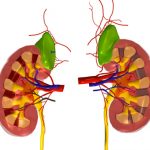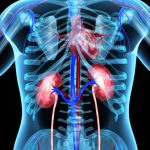 Polycystic kidney disease can cause renal failure, hematuria and kidney stones. Polycystic kidney disease is an inherited disorder where clusters of cysts develop within the kidneys. These cysts are noncancerous and are small sacs of fluid. Their size can vary as they accumulate more fluid, which allows them to grow quite large.
Polycystic kidney disease can cause renal failure, hematuria and kidney stones. Polycystic kidney disease is an inherited disorder where clusters of cysts develop within the kidneys. These cysts are noncancerous and are small sacs of fluid. Their size can vary as they accumulate more fluid, which allows them to grow quite large.
Polycystic kidney disease doesn’t solely affect the kidneys, it can also affect the liver and other parts of the body as well. Although noncancerous, the disease can still lead to other complications, including hematuria and kidney stones.
Advertisement
Hematuria – or blood in the urine – is a common complication of polycystic kidney disease – it occurs in 30 to 35 percent of patients. Hematuria is associated with an increased kidney size and a faster kidney growth rate. Hematuria is commonly caused by bleeding into a cyst that communicates with the urinary tract and bladder. This can occur during strenuous activity and can result in pain. Hematuria can be temporary, lasting up to seven days, and can be resolved with bed rest and staying hydrated. If bleeding does not stop, a procedure may be required to stop it.
Kidney stones, on the other hand, occur within 25 percent of polycystic kidney disease patients. Kidney stones can be quite painful and block urine flow. If blockage is not relieved, kidney function can become lost.
Polycystic kidney disease causes
 Polycystic kidney disease is inherited (genetic) so the primary cause is a genetic defect that often runs in families. There are two different types of polycystic kidney disease based on different defects: autosomal dominant polycystic kidney disease (ADPKD) and autosomal recessive polycystic kidney disease (ARPKD).
Polycystic kidney disease is inherited (genetic) so the primary cause is a genetic defect that often runs in families. There are two different types of polycystic kidney disease based on different defects: autosomal dominant polycystic kidney disease (ADPKD) and autosomal recessive polycystic kidney disease (ARPKD).
ADPKD develops commonly in those in their 30s or 40s but children can develop it as well. For a child to develop ADPKD only one parent needs to have the genetic defect. ADKPD accounts for 90 percent of polycystic kidney disease causes.
ARPKD is a far less common type of polycystic kidney disease and the symptoms are common right after birth. In this type, both parents must have the genetic defect in order to pass it on to their child.
Polycystic kidney disease symptoms
Symptoms of polycystic kidney disease include:
- High blood pressure
- Back or side pain
- Headache
- Increased size of abdomen
- Hematuria – blood in urine
- Frequent urination
- Kidney stones
- Kidney failure
- Urinary tract or kidney infections
Polycystic kidney disease treatment
Advertisement
 Treating polycystic kidney disease involves managing and treating the symptoms associated with it. By controlling the symptoms you can slow down progression and avoid complications associated with the disease. Here are some common methods of polycystic kidney disease treatment.
Treating polycystic kidney disease involves managing and treating the symptoms associated with it. By controlling the symptoms you can slow down progression and avoid complications associated with the disease. Here are some common methods of polycystic kidney disease treatment.
- Controlling high blood pressure
- Medications to control pain
- Draining cysts
- Using antibiotics to treat bladder or kidney infections
- Drink plenty of fluids to drain blood in urine
- Dialysis or a kidney transplant to improve kidney function
- Treating liver cysts
- Getting regularly screened for intracranial aneurysms if patient has history of aneurysms in the family
Polycystic kidney disease diet
Although there is no specific diet for polycystic kidney disease, there are still some important aspects of diet to keep in mind to help maintain kidney health as a whole. A polycystic kidney disease diet should include:
- Low salt, sugar and fat
- Minimal alcohol
- Plenty of fruits and vegetables
- Moderate amounts of protein
- Lots of water and liquids (hydration is very important)
Aside from these diet tips, it’s also important to not smoke, use illegal drug and always remember to exercise for overall good health.
